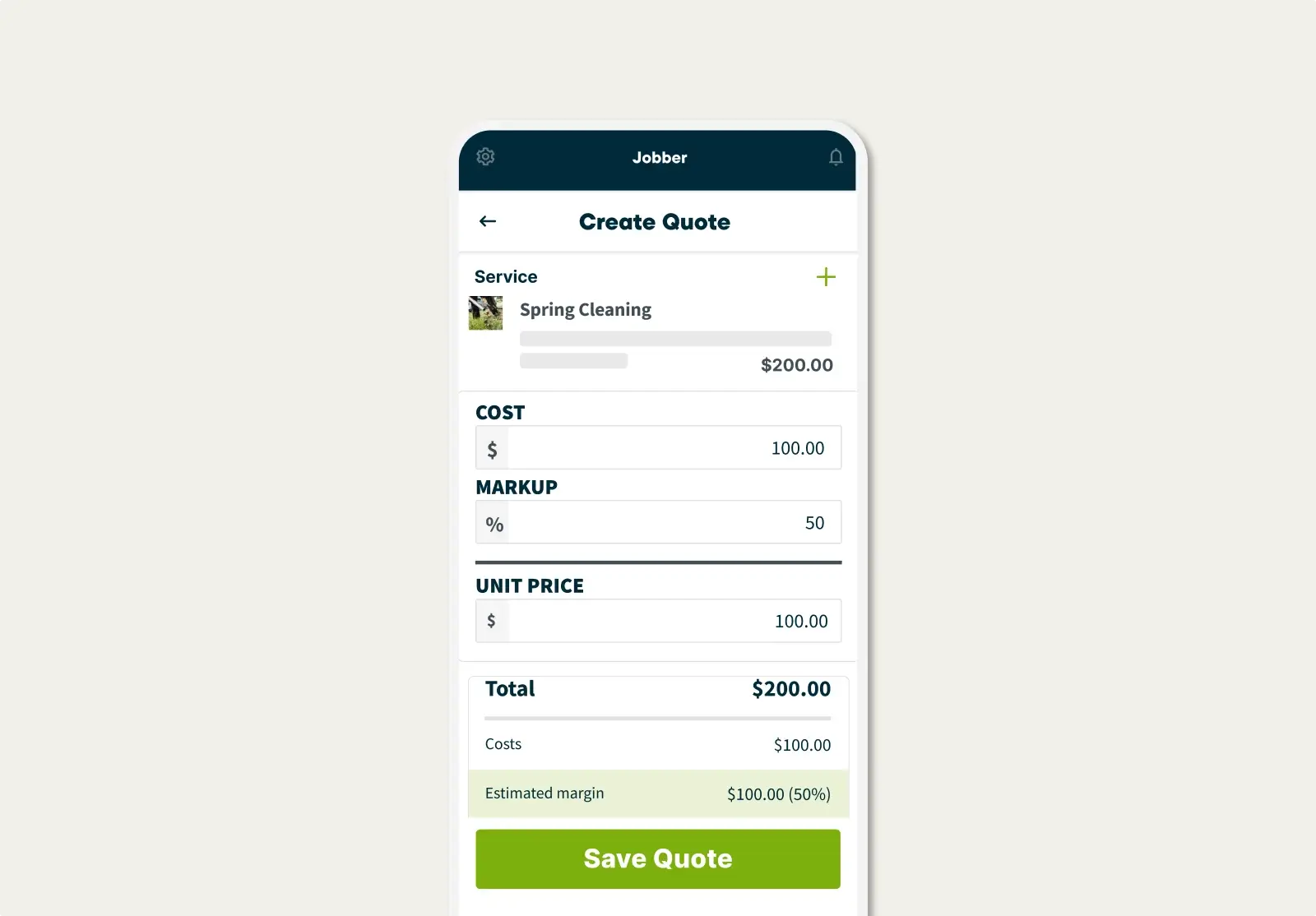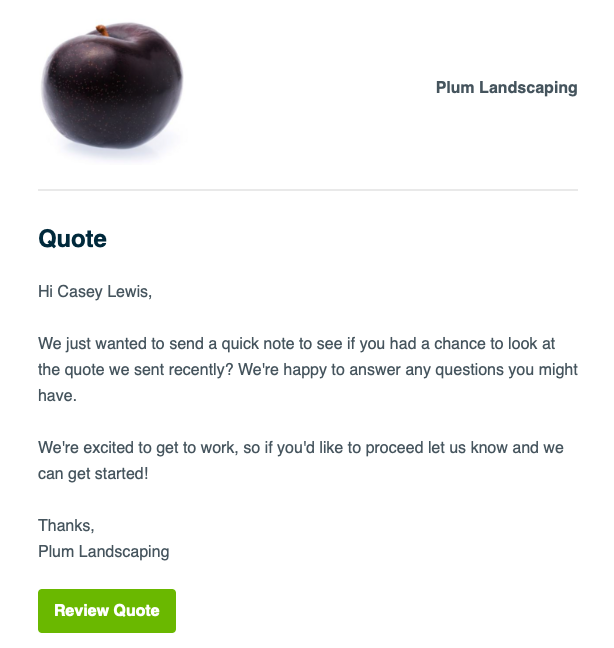How to Bid Landscaping Jobs the Right Way
Successfully bidding a landscaping project is more than just showcasing your knowledge of foliage and design. It’s about submitting a compelling bid that covers your client’s requirements, and all of your services, materials, and labor costs.
Keep reading to learn how to bid on landscaping jobs and secure more work for your upcoming season.
1. Pick the right landscaping projects
Before you dive into the bidding process, make sure you’re choosing the right projects. Ask yourself the following:
- What specific landscaping services does the client need?
- Has my team successfully completed a project with a similar scope before?
- Who is available to work on this project?
- Will the project require any additional resources? (i.e., contractors or rental equipment)
- How long will it take to complete each task individually and the project as a whole?
I think stretching yourself too much is a mistake because you underestimate how much tools and equipment you need to do just one more thing.
If you have any concerns about your ability to complete the project, trust your gut. Look for new landscaping jobs that are a better match for your team’s skill set.
Where to find landscaping projects open to bid
To find open landscaping opportunities, try these resources:
- Search sam.gov for federal level landscaping contract opportunities. You can find projects related to federal lands, buildings, and facilities.
- Check your local state, county, or city website in areas you’re interested in working.
- Visit construction bid websites like Dodge Data & Analytics, Construction Bid Source, and ConstructConnect to view and bid on landscaping projects.
- Check your local Chambers of Commerce to see upcoming projects in the area.
- Create a business profile on lead generation sites, like Thumbtack, HomeAdvisor, or Angi to connect with homeowners looking to complete landscaping projects.
2. Review the bid documents
Take a close look at the bid documents available to get a better idea of what the job’s requirements are. Make sure you understand your client’s vision, needs, and design preferences.
If there are no bid documents available, book some time to meet with the potential client and collect the following information:
- Scope of work: What tasks are involved in the landscaping job?
- Budget: How much is the client looking to spend on the project?
- Timeline: When does the client need the project completed?
- Property measurements: What are the desired measurements of each landscaping element? (i.e., garden beds, pathways, and deck)
3. Draw your design
Depending on the project and the client, you may be required to submit a drawing with your proposal. Including a drawing in your landscaping bid shows the client you share the same vision for the project and can help you land the job.
You can use a lawn care app like iScape to create professional landscape drawings based on your client’s requirements and an image of the property.
READ MORE: 21 lawn care apps to run a better business
4. Price your materials and supplies
List all of the materials needed, including plants, soil, mulch, hardscape materials, and any other supplies. Then calculate the cost of each item.
If you don’t know the cost for each item, don’t guess. Contact your preferred nurseries or vendor to get accurate pricing for all of the materials required for the job.
If you need to rent any landscaping equipment, like a hydraulic auger, sod cutter, or stump grinder, include the cost of the rental with your materials and supplies.
5. Estimate your labor cost
How many workers will you need on the project, and how long will it take them to complete the job?
To calculate your labor costs, multiply your employee’s total labor cost (hourly wages plus labor expenses) by the estimated number of hours the job will take.
For example, if the project is expected to take 30 hours to complete and your hourly labor cost is $32, your estimated labor cost will be $960 (30 x 32).
6. Add your overhead and profit margin
Your overhead costs includes any expenses required to keep your business running, like:
- Landscaping software
- Small business insurance
- Landscaping tools and equipment
- Computers or tablets
- Marketing and advertising
To make sure your overhead costs are covered, tally your estimated weekly overhead expenses, then divide that number by the average number of hours you work per week. This will give you your hourly overhead rate.
For example, if your weekly overhead costs are $200 and you work an average of 40 hours per week, your hourly overhead is $5.
Then, multiply that number by the estimated number of hours for the project. If you expect the job will take 30 hours to complete, your overhead will be:
(200 / 40) x 30 = $150.
Finally, add your profit margin. Your landscaping profit margin is the amount of money you keep after you’ve covered the cost of labor, materials, and overhead.
For your landscaping business to be successful, your profit margin should be between 15% to 45%.
7. Create and send your landscaping proposal
You can use a landscaping estimate template to create a professional bid that’s ready to send to your client.
Your landscaping bid should include the following:
- Your landscaping business name, company logo, and contact details
- Your client’s information, including property address, phone number, and email address
- A breakdown of the landscaping services you’ll be providing, and associated labor costs
- The materials required and cost for each (including plants, sod, mulch, and any decking materials)
- Optional line items for additional services or premium materials
- The total estimated price for the landscaping job, including taxes
- Terms and conditions, including any warranties and payment terms
- A projected timeline for the project, including start and end dates
Once the template is complete, download it as a PDF and attach it to an email to send it to your client. You should also attach your landscaping drawing and service contract.
Or, use Jobber’s landscaping software to create professional bids that are easy for clients to approve online.
You can also suggest premium services or products directly in the quote. Your clients can select the options that best suit their needs, and approve the updated total.

Plus, Jobber helps you set the perfect price every time. View the estimated margin on your quotes, and easily modify your pricing in response.

8. Follow up with your client
If you haven’t heard back within a week or two, follow up with the client to see if they have any questions about your proposal.
Jobber lets you schedule automated quote follow-ups to remind via text or email to remind customers to review your proposal.

Putting together bids for landscaping jobs can be a real headache. You need to pay close attention to details to make sure you’re capturing your client’s requirements and pricing your services for profit.
Jobber’s landscaping software can make bidding projects less of a hassle—saving you time and making you look more professional to potential clients.
Originally published in February 2020. Last updated on March 20th, 2024.